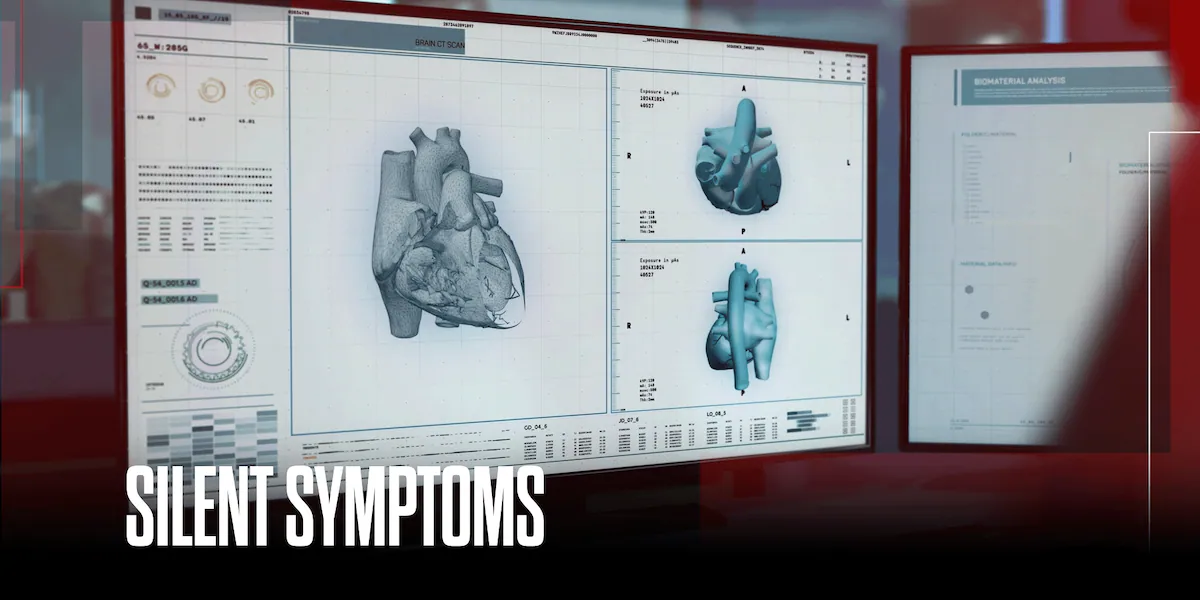Copyright WIS10

(InvestigateTV) — Each year, more than 800,000 people experience a heart attack, which happens when a blockage in a blood vessel cuts off blood supply to the heart, according to the CDC. While most people are familiar with common symptoms like chest pain, shortness of breath and feeling lightheaded, not all heart attacks present with typical warning signs. A 2023 study from the American Heart Association found that about one in five heart attacks is silent, meaning the damage is done but the person is not aware of it. Experts say women are at particular risk for this type of heart attack. Janet Furr experienced a silent heart attack in the summer of 2024 while watering her neighbors’ flowers on a warm, humid day. “I thought gosh my heart was kind of palpitating a little, but and I thought that’s kind of weird, you know, I rushed, came back in, it was hot, drank some water, felt okay, went to sleep, felt fine,” Furr said. The next night, her smartwatch alerted her to a rapid heartbeat. At the hospital, she learned she had suffered a heart attack in the previous 24 hours. Research gaps in women’s cardiovascular health According to the Cleveland Clinic, silent heart attacks can be just as dangerous as heart attacks with intense symptoms. While experts acknowledge that silent heart attacks are more common in women than men, the reason isn’t clear. “It’s very unclear why men and women have different sensations,” said Dr. Leslie Cho, director of the Women’s Cardiovascular Center at the Cleveland Clinic. Cho said one important factor is that historically, the cardiovascular system has only been studied in male bodies. “There is truly sex differences in heart disease. And we continue to lag behind in our knowledge of a woman’s heart,” Cho said. In 2020, Cho helped write the American Heart Association and American College of Cardiology’s first comprehensive study of women’s cardiovascular health since 2011. Pregnancy-related risk factors Women face unique risk factors for heart disease, including adverse pregnancy outcomes such as high blood pressure during pregnancy, gestational diabetes and premature delivery. “So if you had high blood pressure during pregnancy, gestational diabetes during pregnancy, if you delivered very prematurely, those are all increased risk for having heart disease later on,” Cho said. According to the American College of Cardiology, adverse pregnancy outcomes occur in up to 20% of all pregnancies and can increase the risk of cardiovascular disease up to fourfold. The Cleveland Clinic now refers patients with adverse pregnancy outcomes to its preventive cardiology department. “So we can actually assess you, not to start you on medicine, but to make sure that you’re on a good pathway so that you don’t develop high blood pressure, so that you don’t develop diabetes later on,” Cho said. SCAD poses an additional threat Women also face risk from spontaneous coronary artery dissection, known as SCAD, which occurs when there’s a tear in the wall of a coronary artery. Blood can get trapped in the artery walls, potentially triggering a heart attack. Vicki Mascareño Nelson experienced SCAD just after Valentine’s Day in 2024, initially dismissing intense chest pain as heartburn. “First, I got a really funny feeling over my body. That’s all I can say, really funny feeling, and it made me stop,” Nelson said. “I did not know I was having a spontaneous coronary artery dissection.” More than 90% of SCAD cases occur in women, suggesting fluctuations in female hormones may play a role. People who have recently given birth and women experiencing postmenopause are at the highest risk. The telltale signs of SCAD are heart attack symptoms, including chest pain, dizziness, heart palpitations and shortness of breath. Dr. Sherrie Khadenga, a cardiologist at the University of Vermont Medical Center, said many women are familiar with pain and used to putting others’ needs first, making them less likely to reach out for help. “It’s important for women in particular to recognize if they feel something off, that they shouldn’t just brush it off,” Khadenga said. Nelson hopes her experience will inspire other women to advocate for themselves. “I hope that we listen to our bodies more and that when we need to slow down and take care of ourselves, we’re able to advocate for ourselves in order to do it,” Nelson said. Atypical symptoms are more common in women Women are also more likely to experience atypical heart attack symptoms. Cho said up to 30% of women who have had a heart attack experienced an atypical symptom. “Oftentimes, women will complain about things like shortness of breath, extreme shortness of breath, nausea, vomiting. Some women will say they feel jaw pain or radiation down their left arm or their back,” Cho said. Other atypical symptoms can include anxiety and extreme fatigue. Submit story tips to our Investigators Share errors or concerns with our Digital Editors Watch full episodes of InvestigateTV+ Subscribe to the InvestigateTV YouTube Channel



